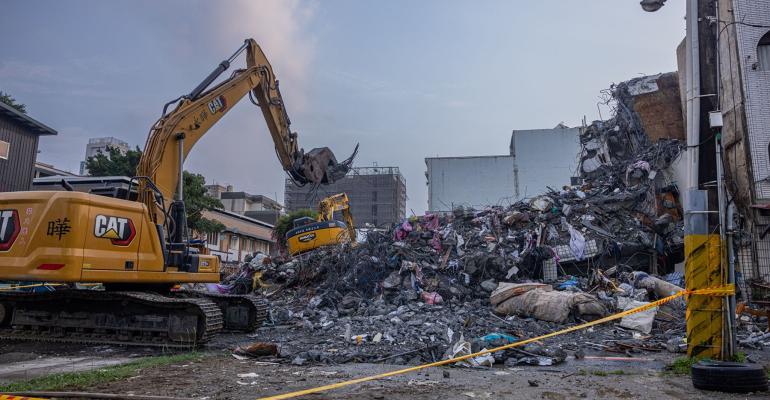(Bloomberg) -- Taiwan’s semiconductor industry restarted operations and emergency personnel worked to help injured and trapped citizens as the island begins to recover from its worst earthquake in 25 years.
Taiwan Semiconductor Manufacturing Company, the leading producer of advanced chips for Apple and Nvidia Corporation, said it would resume production less than 24 hours after evacuating staff and halting operations. The company said there has been no damage to its most critical chip-making equipment.
That statement was bolstered by news on Thursday from Tainan Science Park, where many of those advanced chips are manufactured, that most operations have resumed.
Technological advancements in Taiwan appear to have kept damage and casualties relatively low after the 7.4 magnitude quake struck the island’s east coast early Wednesday. The government revised building codes and other regulations after a 1999 temblor that killed more than 2,400 people.
While the full extent of the damage from the latest quake isn’t yet known, the latest figures are 10 people dead and more than 1,000 injured. The government said 642 people were trapped or cut off because of road closures and debris as of Thursday afternoon.
Taiwan plays an outsized role in the global economy because its companies craft the semiconductors at the foundation of technologies like artificial intelligence, smartphones, and electric vehicles. Led by TSMC, national players produce an estimated 80% to 90% of the highest-end chips.
Taiwan’s biggest chipmaker had said late Wednesday that it had brought 70% to 80% of machinery back online within 10 hours after the earthquake hit. Its most expensive gear is extreme ultraviolet machines from ASML Holding, which are used to engineer processors for the latest iPhones and Nvidia chips for training AI models like ChatGPT.
“There is no damage to our critical tools including all of our extreme ultraviolet lithography tools,” TSMC said in a statement late Wednesday. A small number of tools were damaged at some facilities, but the company is deploying all available resources to ensure a full recovery, it added.
The smaller United Microelectronics Corp. also said it would restart normal operations and shipments, and that the quake had not had any major impact on operations. UMC had halted some machinery at some plants and evacuated certain facilities at its hubs in the cites of Hsinchu and Tainan.
TSMC affiliate Vanguard International Semiconductor Corporation said it brought about 80% of its machinery back online by Thursday noon and is resuming production gradually.
The island’s markets were closed on Thursday for a national holiday.
Some of the island’s tech firms are still assessing the damage from the earthquake, which leveled dozens of buildings on its eastern side. Barclays analysts had warned that any halt in production could threaten to upset production processes that can require uninterrupted seclusion in a vacuum for weeks on end.
“Some of the high-end chips need 24/7 seamless operations in a vacuum state for a few weeks,” analysts Bum Ki Son and Brian Tan wrote shortly after the quake. “Operation halts in Taiwan’s northern industrial areas could mean some high-end chips in production may be spoiled.”
Yet the assessments of damage quickly grew more optimistic. Citigroup Inc. analysts said the impact on TSMC’s operations should be “manageable” and Jefferies Financial Group analysts said the downside should be “limited.”
“Thankfully, building codes were fully revised following that disaster, and harm so far looks limited even at the epicenter,” they wrote.
Wu Yih-min, a professor of geosciences at National Taiwan University and a team head at the National Science and Technology Center for Disaster Reduction, said that the agency had developed a more sophisticated disaster response system in the last three to five years. That’s been critical because of the island’s vulnerability to seismic activity.
“Taiwan continues to develop these technologies, and we have advantages,” Wu said, adding that it would be harder for regions without a strong tech industry.





